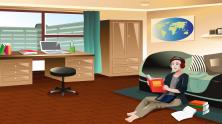
Beginning your university life in the UK, away from home and friends can be new and exciting. As there are two sides of a coin, this journey can also be stressful with new social pressures, new responsibilities, new expectations, environment and lifestyle. Life can be stressful at the university. Mental health problems are common among students.
I am not writing this article with a clinical perspective. My aim is just to present common perspectives and some remedies you can try until you start medication.
Alan Percy, head of counselling at the University of Oxford, stresses that numerous students who come here don’t have a mental health condition. He further adds, “Students often come to us expecting to be given a prescription of some kind, but a lot of difficulties are not caused not medical problems, but by normal life problems, such as family or relationship issues, or anxiety about their work, while these problems are distressing, through counselling we can help students to understand them, and then suggest strategies for dealing with their feelings.”
Symptoms
-
Feeling hopeless, irritable, anxious or worried
-
Feeling unable to cope with every-day things that you would not have thought twice about in the past
-
Losing your appetite, losing/gaining weight
-
Harming yourself or other people
-
Loss of interest or pleasure in most or all activities such as sex, hobbies or sports
-
Feeling of tiredness and lack of energy
-
Slowed thinking, speaking or body movements
-
Trouble in thinking, concentrating, making decisions and remembering things
-
Unexplained physical problems such as back pain or headaches or body pain
-
Use of drugs and alcohol
-
Avoidance of social interaction
Types
There are different types of depression. The depression condition can largely be classified in three categories i.e. mild, moderate or severe.
-
Mild depression: This type of depression can be classified as one with a very few symptoms. This doesn’t impact your daily life in a great way.
-
Moderate depression: This type of depression affects your daily life. This depression has more symptoms as compared to mild depression.
-
Severe or major depression: In this type of depression, you lose interest in everything and in your day-to-day activities including eating and sleeping. It may feel like you have lost touch with reality.
Other types of depression are
-
Dysthymia: This type of depression is characterized with regular low mood.
-
Bipolar affective disorder: This type of depression is also known as manic depression. This is greatly responsible in causing mood swings from very excitement and elation to despair and feeling lethargic. You may also find yourself doing illogical things.
-
Seasonal affective disorder (SAD) In this type of depression, your mood might be affected during autumn and winter months. This type of depression was also a result of lack of sunlight as daylight hours become short.
Speak up
If you are feeling unhappy consistently or lose interest, enjoyment and the feeling doesn’t go away, then you should talk to somebody or make an appointment with your GP or student support department. This is important if your academic performance is being affected. Experiencing some stress as a student is common. However, if you are uncomfortable with a number of thoughts you are recently carrying, then you should definitely talk.
Universities these days offer free and confidential in-house counselling service, with professionally qualified counsellors and psychotherapists. This counselling service is available to both undergraduates and postgraduates.
-
Be more active: Don’t remove yourself from life’s equation. Instead, make a schedule and do more socializing. Keep in touch with your friends and family, go for a run, go for more movies, go to museums, go out for dinner, shopping, prepare CV, take up a new hobby and start travelling.
-
Face your fear: The things you were running away from start facing them. It’s okay to feel anxious. However, it is important to utilize that energy in the right direction. Expose yourself to the fear and welcome the worst.
-
Avoid alcohol: You can easily have a temporary relief. However, before you know it, alcohol will be a part of your life. And in the end, it will make you feel more depressed.
-
Have a routine: Start your day early in the morning. Go to the library, go to your school and do your work on time. Sleep on as much normal time as possible. Start healthy eating and stop avoiding meals.
-
SAD Lights: Use of SAD lights is clinically proven method to treat SAD depression. You can put these lights in your room to treat the disorder.
Reach out and seek help, you will be amazed about how many stories are there. You are not alone.








